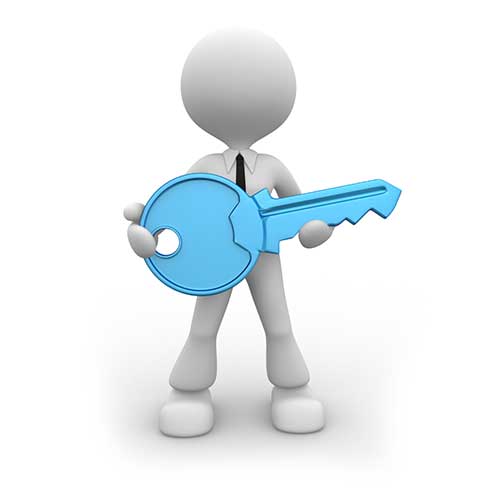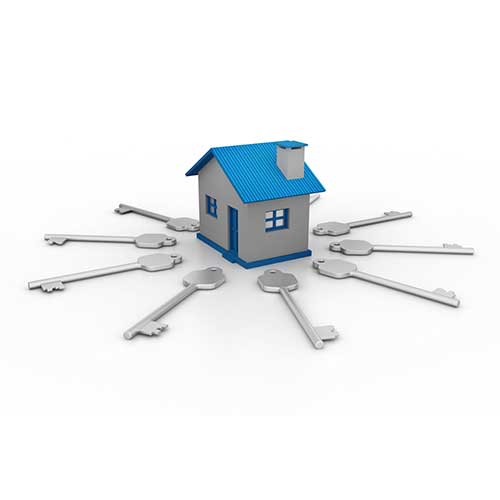What Types of Locks are Right for You?
When you start shopping for the right locks for your home or business, you’ll soon see that there’s an almost endless array of locks. To sift through this vast selection, ask yourself these questions:
- Where exactly will you install the lock?
- What level of security do you need?
- Who will use the lock?
- What are the surroundings like where the lock is to be installed?
Here are some of the most popular locks. Let’s look at their security features:
Knob locks are sometimes used as the sole source of security for exterior doors at home, although they’re also often installed in addition to deadbolts. A knob lock by itself isn’t fully secure, because the lock cylinder is in the knob itself instead of in the door. A knob lock can be broken off of your door by a professional burglar with a hammer. It can also be forced open with pliers, or using a wrench behind the knob, bypassing the locking cylinder. If you have only knob locks, it will be a good idea to replace them with basic passage knobs. If you use deadbolts too, you’ll be much more secure.
Rim cylinder locks can help upgrade your security. You frequently see these locks on entry glass doors, commercial doors, and sometimes on apartment complexes. These locks are typically used in rim latch locks, mounted on the inside of the door. Rim cylinder locks have a long metal piece extending out from the back of the lock, which runs through the door into a locking mechanism on the opposite side of the door.
Deadbolts are truly the safest and most secure locks available for your home, as any professional locksmith will tell you. They’re called “dead” because there aren’t any springs to operate the bolt; a deadbolt is operated manually ~ that is, with a thumbturn or key.
Deadbolts are to be installed on external doors in four types: single-cylinder, double-cylinder, jimmy-proof, and lockable thumbturn.
A single-cylinder deadbolt is the usual deadbolt lock we normally imagine, with its key cylinder on the outside. A thumbturn on the inside opens and closes it. They’re usually used on solid doors, made of wood or metal. The one weakness of this type of deadbolt is that if there’s any potential access to the inside (through a window close by, or even through the peephole, which a professional thief will know how to do), the door can be opened using the thumbturn.
The remedy for this issue can be the double-cylinder deadbolt, which has a key cylinder both inside and outside the door. That means that if the door is locked, the double-cylinder needs a key to open it from the inside. This deadbolt is good if your door has a window in it, or if there’s a window near the door, since it prevents someone from breaking the glass and reaching in to unlock the door. Its drawback is that it can be unsafe in case of fire. Therefore, if you use this type of deadbolt in your residence, make sure that there’s always a key left on the inside whenever there are people at home, so that in an emergency you can all get out fast.
A jimmy-proof deadbolt is a surface-mount lock, which you’ll often find on double doors and at apartment houses. This kind of deadbolt is sometimes preferred because minimal door modifications are needed. The way this unique lock works is that the deadbolt interlocks with the jamb bracket, which keeps it from the vulnerability of being pulled apart or forced from the outside by a burglar. A surface-mount lock means that the lock screws into the inside of the door, instead of with a drill pattern, as a standard deadbolt does.
The lockable thumbturn deadbolt is basically a combination of a single-cylinder and a double-cylinder deadbolt, giving optimum flexibility and security. It has a thumbturn on the inside, which functions just like a conventional single-cylinder deadbolt, except that it can be locked with a key, so it can’t unlock or lock the door. This means that the thumbturn can be left in an unlocked position while people are home, but it will operate just like an ordinary single-cylinder deadbolt. When everyone leaves, especially for a long time, the thumbturn can be locked easily, so that even if someone gains access to the door from the inside, the deadbolt itself cannot be unlocked.
Cam locks are used in mailboxes, filing cabinets, and cupboards. They come in various lengths, with a variety of tailpieces or “cams,” which interface with another lock mechanism.
Lever handle locks are often used for inner doors in commercial buildings. When you need handicapped accessibility, a lever lock is best. They’re easier to open than knob locks, since they have a large push-down handle, rather than a knob that you grasp and turn.
Mortise-cylinder locks are threaded, screwing into mortise hardware that’s mounted inside the door. These locks are held in place by a set screw. The cam activates the locking mechanism. Mortise cylinders come in several lengths, with many options for the cams, depending on the hardware you use.
A rim latch lock has a rim cylinder on one side, with a surface-mount latch lock on the other side. Popular in apartment buildings, a rim latch locks automatically as the door shuts behind you.
A wall-mounted lock is mounted in the wall, just as its name says. One example is a firefighter's box-style lock, which you’ll often see at a larger business, which provides emergency access to the keys to the building. A wall-mounted lock can be a small safe, for storing important items. They’re generally installed at the time of construction, although it’s possible to install one at your existing facility. A wall-mounted lock has a cover or alarm sensor, which allows for networking into the building’s security system, which means that any unauthorized access will be detected instantly.
In addition to all of these locks, there are many more, used for all sorts of purposes. To find each lock that’s right for you, bring all your questions to an expert locksmith. If you’re located in Newton Centre, Massachusetts, it would be a good idea to contact the mobile professional locksmiths on staff at 24-Hour Newton Locksmith.
Other Locksmith Articles:
- Why You Should Have Deadbolts As A Homeowner
- Benefits of Keyless Entry
- Lockouts – Why Call A Locksmith!
- Importance of Panic Bars for Commercial Properties
- Security for Residential Property
- Signs Betters Security Is Needed
- Tips to Hire A Good Locksmith
- Various Kinds of Locks
- What To do Car Key Stuck in Ignition
- Why Let a Locksmith Replace Your Car Keys
- When to Call Emergency Locksmith
- Locked Out Of Your Car
- Weather Changes Affect Door Locks
- Advantages Of Commercial Keyless Locks
- Child-Proof Locks: Keeping Home And Kids Safe
Quick Response Time. 24/7 Mobile Emergency Locksmith Service.
For immediate locksmith service, dial:
(617) 401-7740
24 Hour Newton Locksmith accepts all major credit cards:


24 Hour Newton Locksmith
24 Hour Mobile Locksmith Service1269 Centre St, #C1, Newton Centre, MA 02459
Phone: (617) 401-7740
www.newtonlocksmith.org



